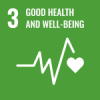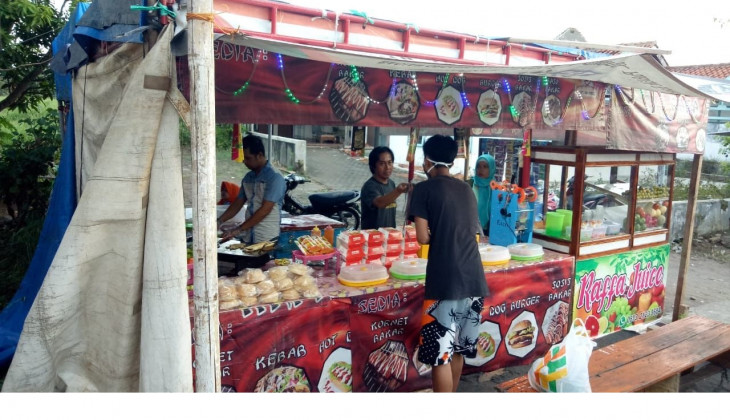While the Covid-19 pandemic began to break out, Rimawan Pradiptyo, a lecturer at the Faculty of Economics and Business Universitas Gadjah Mada, was moved to do something. He did not want to be silent or work from home in the early days of the Covid-19 pandemic.
It came out of his mind to make a humanity movement with his friends. According to him, no country is ready to face the Covid-19 pandemic, how is the transmission so fast, it is difficult to be observed, and its characteristics are uncertain.
He then wanted to create a movement called Sambatan Jogja (Sonjo). A humanity movement that focuses on helping vulnerable communities at risk of being affected by the spread of Covid-19.
“Sonjo is a movement to use the WhatsApp group (WAG) as the main media in coordinating to carry out various programs,” he said, Saturday (4/7).
Rimawan explained that during the Covid-19 pandemic, the physical market suddenly disappeared. Because of work from home (WFH) and physical distancing, there is no meeting between the seller and the customer.
“The online market that did not exist before suddenly appeared with the WAG SONJO. Demand and supply of food, medical equipment, and various problems in the field are easy to solve together,” he said.
WAG Sonjo can help solve various problems and bring together parties who need assistance and those who want to distribute aid. In the WAG Sonjo, there is no money at all. There is even a prohibition on placing advertisements or anything that includes account numbers.
Demand here includes hospitals, health workers, NGOs, academics, entrepreneurs, community groups, and others. Meanwhile, the supply consists of academics, business people, NGOs, MSMEs, community groups, LAZ, State-Owned Companies, Regional-Owned Companies, and others.
“In Sonjo, there is an interaction between demand and supply; thus, problems can be resolved. It attempts to create a market, but a market for aid and those who want to be helped. For example, someone needs PPE aid, then the group responds. Recently there was a party from Australia offering ventilator aid. I offered it to the group. It was immediately responded”, he said.
Rimawan admitted that he did not have a grandiose program when he founded Sonjo. For him, the most important thing is that every day there is a target in the form of small changes that can be made to help people survive.
“Never stop, every time we can make small changes, at the end of the day we should be grateful, then sleep, and the next day we try again to make small changes, whether it helps distribute medical devices and others,” he explained.
Even though the government has budgeted 405 trillion rupiahs to tackle Covid-19 and its recovery efforts, the war against Covid-19 cannot be entirely left to the government’s responsibility. All elements of society must work together with the government, both at the central and regional levels, to tackle this pandemic’s impact.
“Sonjo was founded on March 24, 2020, and is developing very fast. On April 17, 2020, 7 WAGs were formed, which focused on certain fields. On June 22, 2020, 2 WAGs were formed again, a total of 9 groups and more than 500 members who focus on the fields of economy, health, education, and others,” he explained.
The nine WAGs that are made are, of course, following their respective themes. First, Sonjo headquarter (HQ). This group accommodates all members of Sonjo’s group. Second, there is the Sonjo Database. This group is the admin center and database to support the Sonjo movement.
“The demand and supply database identifies problems and discussions in the WAG. Notes are made and updated every night. Fill out the form on the Google sheet to identify the parties’ various program activities and the need for assistance from the parties,” he said.
Third, there is Sonjo Pangan. In this group, the focus is on overcoming fulfillment problems or food needs in the Special Region of Yogyakarta Province. The main thing is to bring together, for example, from MSMEs.
The fourth Sonjo Innovation, this group focuses on building a prototype medical equipment that previously had to be imported so that it can be produced domestically. In this group, they gathered from the Faculty of Medicine, Faculty of Pharmacy, Faculty of Engineering, and Faculty of Mathematics and Natural Sciences to unite and then think about what tools to produce to make innovations in the short term.
“The Sonjo Innovation Group focuses on the need for medical equipment to make its prototype and also what technology findings are already available at UGM. Some people coordinate tailors at home, make PPE, even the innovators at UGM are also involved. Some make head shields and others”, he said.
Fifth is Sonjo Legawa. This group focuses on organizing social organizations to optimize the distribution of humanitarian aid. Here is a collection of humanitarian agencies.
“Not to raise funds, we do not distribute, only if some people distribute it, they must explain where it has been distributed, when and to whom as well as in what form; thus it does not overlap or be uneven. Meanwhile, the relatively new groups are namely Sonjo Media and Sonjo Learning”, he explained.
Rimawan said that Sonjo should ideally be applied to a limited or small environment such as a community unit, village, sub-district, regency, or several regencies, such as in the Special Region of Yogyakarta. Yogyakarta is ideal for Sonjo because it only consists of 5 regencies, while to be broader, Sonjo’s coordination will be much more complicated.
“If there are 150-200 households in one community unit, there must be demand and supply for various daily needs. Ideally like that, even so, this Sonjo can be made in other areas outside Yogyakarta according to their respective characters”, he added.
Once again, Rimawan emphasized that Sonjo exists to help vulnerable groups and avoid overlapping aid, such as the issues of basic food and medical equipment that sometimes arise.
Source: https://ugm.ac.id/id/berita/19665-sonjo-upaya-kemanusiaan-di-tengah-pandemi-covid-19



